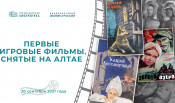
The first feature films made in Altai spotlighted at the Presidential Library
September 20, 2021, the Presidential Library hosted a video lecture entitled The First Feature Films Made in Altai as part of the Knowledge of Russia project. The event was organized jointly with the Shishkov Altai Regional Universal Scientific Library (Barnaul), which has been running the Regional Center of the Presidential Library since 2015.
The video lecture was free. The meeting was broadcasted live on the Presidential Library's portal in the Live broadcast section in accordance with the program of live events, on the institution's YouTube channel and in the group of the Presidential Library's Poetry Club on the VKontakte social network.
Elena Ogneva, Deputy Director for Research of the State Museum of the History of Literature, Art and Culture of Altai, a member of the Union of Cinematographers of the Russian Federation, talked about the development of cinematography in Altai Territory. 124 years ago, the first sessions were held in Barnaul with the help of the Cinematograph apparatus, created by the Lumiere brothers. Since that time, much has changed in the city: cinema has become both a new form of entertainment and a way of educating a wide audience.
The video lecture participants learned about the events associated with the performances of feature films that have gone down in the history of Russian cinema. Thus, Altai is shown in the first Siberian feature film "Red Gas" directed by Ivan Kalabukhov. Besides, the region became a set for the works of such famous masters of cinema as Alexander Razumny, Vladimir Shneiderov, Alexander Zguridi, and Alexander Row. Their famous films "Valley of Tears", "Golden Lake", "White Fang", "Koschey the Immortal", created in the 1920s-1940s, are distinguished by their novelty in themes and original pictorial solutions of natural scenes.
One has the opportunity to learn more about the history of cinema from the Presidential Library’s materials thanks to the extensive collection Marking the Year of Russian Cinema. It contains more than 600 materials, including rare documents from the beginning of the last century, theoretical studies of the same time and modern ones, movie posters and movie posters reflecting various aspects of the development of Russian cinematography.
Interactive lessons and video lectures are regularly held in the Presidential Library, detailed information about which is available on the institution's portal in the Multimedia lessons section and in the Video lectures for school section, where records of past lectures and open lessons are presented.





